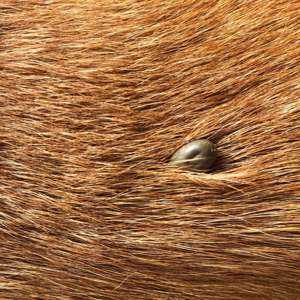Ticks can transmit diseases, such as Lyme disease. In the Netherlands, Ixodes ricinus is the most common tick species and can be found on all mammals. However, not all ticks carry Lyme disease.
From March to October, ticks climb onto grass stems or shrubs and drop onto a passing host, for example during a trail ride or when horses are grazing in tall grass. It is especially important to remove a tick as quickly as possible. The longer it stays on the horse, the higher the risk of transmitting an infection. Use a special tick remover or tick tweezers.
It is advisable to check for ticks daily. Especially after a ride, it is wise to inspect your horse a few hours later.
For more information, visit www.paardenarts.nl/kennisbank/teken/
Want to order a tick remover? Go to www.horsefitshop.nl
Hellen Van De Graaf: “There are definitely products on the market that work perfectly. I work for the military and we provide products containing permethrin (formerly DEET). I personally use it on my horse, especially on warm areas where ticks prefer to settle, such as the groin, inner thighs, and armpits. If you spray or rub these areas, you’ll have less trouble. I now use Biokill for my horse, which comes in a larger bottle. It's ideal against many parasites, including lice, and you can even spray it around the stable to eliminate pests. Many chicken owners know it for use against red mites. It's a safe product, also for your animal. I’ve been using it for my horse for five years now, and we're both still alive.”

.jpg)